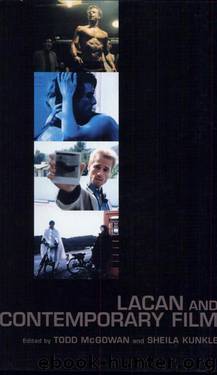Lacan and Contemporary Film by Todd Mcgowan & Sheila Kunkle

Author:Todd Mcgowan & Sheila Kunkle [Mcgowan, Todd & Kunkle, Sheila]
Language: eng
Format: epub
ISBN: 9781590510841
Amazon: 1590510844
Publisher: Other Press
Published: 2004-02-16T23:00:00+00:00
Confronted with the hegemonic (universal) assertion that subjectivity has nothing to do with economy, that our emotional lives are private and as such discrete from public dynamics, that our bodies may slave for the man but we are the master of our own-desires, we might easily hasten to articulate a particular exception: sometimes our emotions have to do with our jobs, sometimes we love for money, sometimes personal preferences like racism erupt into the neutral field of the liberal system, sometimes people find political power sexy. Jack needs love to keep being a credit to capitalism. But just as in the example of the bootstraps, both of these formations (universal and particular) are merely different tactics for the same task: the point of fundamental convergence between the universal and the particular occurs in their mutual foreclosure of the abject true opposite. “Universal” and “particular” are here two modes of denial of the direct coincidence between libido and capital, between private and public, between subjectivity and economy. As subjects under capitalism, our identities, our feelings, and our urges are profoundly embedded in the structures of private ownership of means of production, exploitation of labor, and abjection of a permanent underclass. More than a simple base determinism, this embeddedness, this integrality, this intricacy of intimacy and economy must be rather interpreted as a mutual constitution. The pseudoautonomy of identification (processes and mechanisms of forming and sustaining selves) and capitalization (processes and mechanisms by which capitalism forms and sustains itself) must be exposed.
It is only against this formulation that we can assess the gesture of The Family Man: just like the dynamic antinomy, the film consolidates within one textual operation the hegemonic position and the particular exception. Rather than reading this consolidation as the colonization of critique (The Family Man co-opts the standard critical gesture of highlighting particular exceptions; the system interpellates an alienated subject and is therefore total), we have to insist here on a rigorous extrication of true critique from false critique. The Family Man unwittingly creates the conditions under which it is possible to do so, to read the standard critical/ counterideological gesture of voicing particularity as systemically overdetermined. True and false critique are not aligned as simple antipodes, because the system has intervened in such a contrast through positing its own (false) version of the true, which, consequently, is to be distinguished from the “true” true one. In The Family Man, for example, the false-true is the notion of love as the authentic antidote to alienation. What ipay have been a contradiction of two terms (true/false or particular/universal) has therefore passed to a tension among three (false/false-true/true-true or universal/particular/abject) .
To be sure, The Family Man evidences the viral colonialism of ideology, but we must interpret this expansion as a necessary territorial exaggeration. When an ideology is increasingly explicit about its own ideological status, the very appearance of success of ideological functioning (“even criticism is now the province of ideology”) bespeaks its own fissures. Indeed, the hegemonic articulation of love
Download
This site does not store any files on its server. We only index and link to content provided by other sites. Please contact the content providers to delete copyright contents if any and email us, we'll remove relevant links or contents immediately.
Still Foolin’ ’Em by Billy Crystal(36349)
Spell It Out by David Crystal(36110)
The Great Music City by Andrea Baker(31916)
Professional Troublemaker by Luvvie Ajayi Jones(29651)
Trainspotting by Irvine Welsh(21643)
Call Me by Your Name by André Aciman(20498)
The Secret History by Donna Tartt(19052)
We're Going to Need More Wine by Gabrielle Union(19034)
Cat's cradle by Kurt Vonnegut(15335)
Ready Player One by Cline Ernest(14644)
Molly's Game by Molly Bloom(14133)
Bombshells: Glamour Girls of a Lifetime by Sullivan Steve(14057)
The Goal (Off-Campus #4) by Elle Kennedy(13657)
Leonardo da Vinci by Walter Isaacson(13316)
4 3 2 1: A Novel by Paul Auster(12375)
The Social Justice Warrior Handbook by Lisa De Pasquale(12187)
The Break by Marian Keyes(9358)
Crazy Rich Asians by Kevin Kwan(9277)
The remains of the day by Kazuo Ishiguro(8975)
